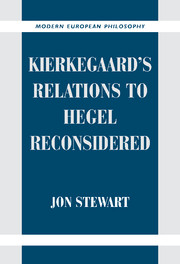Book contents
- Frontmatter
- Contents
- Acknowledgements
- Abbreviations of Primary Texts
- Preface
- Introduction
- 1 Kierkegaard and Danish Hegelianism
- 2 Traces of Hegel in From the Papers of One Still Living and the Early Works
- 3 The Ironic Thesis and Hegel's Presence in The Concept of Irony
- 4 Hegel's Aufhebung and Kierkegaard's Either/Or
- 5 Kierkegaard's Polemic with Martensen in Johannes Climacus, or De omnibus dubitandum est
- 6 Kierkegaard's Repetition and Hegel's Dialectical Mediation
- 7 Hegel's View of Moral Conscience and Kierkegaard's Interpretation of Abraham
- 8 Martensen's Doctrine of Immanence and Kierkegaard's Transcendence in the Philosophical Fragments
- 9 The Dispute with Adler in The Concept of Anxiety
- 10 The Polemic with Heiberg in Prefaces
- 11 Subjective and Objective Thinking: Hegel in the Concluding Unscientific Postscript
- 12 Adler's Confusions and the Results of Hegel's Philosophy
- 13 Kierkegaard's Phenomenology of Despair in The Sickness unto Death
- 14 Kierkegaard and the Development of Nineteenth-Century Continental Philosophy: Conclusions, Reflections, and Reevaluations
- Foreign Language Summaries
- Bibliographies
- Subject Index
- Index of Persons
6 - Kierkegaard's Repetition and Hegel's Dialectical Mediation
Published online by Cambridge University Press: 13 March 2010
- Frontmatter
- Contents
- Acknowledgements
- Abbreviations of Primary Texts
- Preface
- Introduction
- 1 Kierkegaard and Danish Hegelianism
- 2 Traces of Hegel in From the Papers of One Still Living and the Early Works
- 3 The Ironic Thesis and Hegel's Presence in The Concept of Irony
- 4 Hegel's Aufhebung and Kierkegaard's Either/Or
- 5 Kierkegaard's Polemic with Martensen in Johannes Climacus, or De omnibus dubitandum est
- 6 Kierkegaard's Repetition and Hegel's Dialectical Mediation
- 7 Hegel's View of Moral Conscience and Kierkegaard's Interpretation of Abraham
- 8 Martensen's Doctrine of Immanence and Kierkegaard's Transcendence in the Philosophical Fragments
- 9 The Dispute with Adler in The Concept of Anxiety
- 10 The Polemic with Heiberg in Prefaces
- 11 Subjective and Objective Thinking: Hegel in the Concluding Unscientific Postscript
- 12 Adler's Confusions and the Results of Hegel's Philosophy
- 13 Kierkegaard's Phenomenology of Despair in The Sickness unto Death
- 14 Kierkegaard and the Development of Nineteenth-Century Continental Philosophy: Conclusions, Reflections, and Reevaluations
- Foreign Language Summaries
- Bibliographies
- Subject Index
- Index of Persons
Summary
After Either/Or the next two pseudonymous works to appear were Fear and Trembling and Repetition, which were both published on October 16, 1843 (the same day that Three Edifying Discourses appeared in Kierkegaard's own name). These two works introduced two new pseudonyms into the authorship: Johannes de silentio of Fear and Trembling and Constantin Constantius of Repetition. I will treat Repetition first since I wish to establish the connections between it and De Omnibus. Repetition seems to have been written in part during Kierkegaard's short stay in Berlin in May of 1843 and in part upon his return to Copenhagen. The concept of repetition is a central one for Kierkegaard. Prior to the book Repetition, the concept appears in Either/Or and De Omnibus and then after it in The Concept of Anxiety. Moreover, repetition seems to be linked closely to other well-known Kierkegaardian concepts such as “the paradox” and “the moment.” Although it is a central concept, it was relatively short lived in Kierkegaard's total authorship. It spans the period from Either/Or (February 20, 1843) to The Concept of Anxiety (June 17, 1844), after which it virtually disappears. In this chapter I will limit myself to an analysis of the concept of repetition only as it is relevant for Kierkegaard's understanding of and relation to Hegel. Thus, I cannot in this context treat the concept itself exhaustively and am obliged to omit an extended analysis of many of its important aspects.
- Type
- Chapter
- Information
- Kierkegaard's Relations to Hegel Reconsidered , pp. 282 - 304Publisher: Cambridge University PressPrint publication year: 2003

